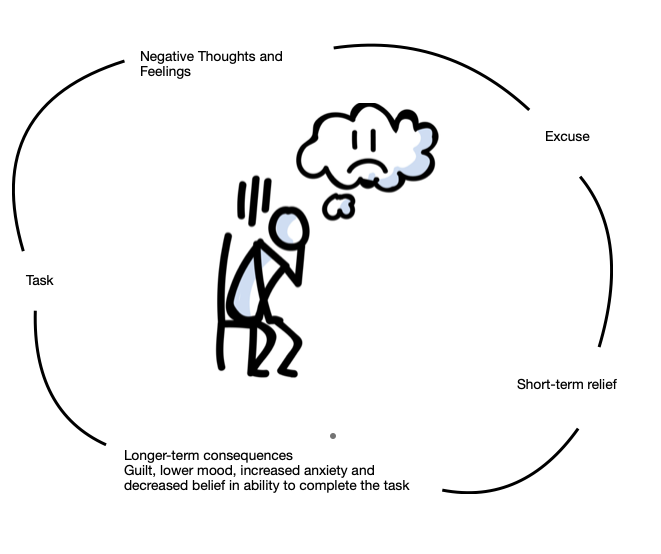Procrastination – the action of delaying or postponing something
Oxford English Dictionary
We’re all guilty of procrastination from time to time. I know that when I have an exam or job interview to prepare for my desk suddenly become very tidy and it’s really important to put that wash load on etc. etc. … any excuse not to make a start!
When we are struggling with depressed mood or anxiety, procrastination can become an even bigger problem. We know there are various things which we should be doing but we lack the energy and motivation to even begin. The smallest task can feel like climbing Mount Everest. Perhaps we are worried that if we try to make progress we will fail or something will go wrong. So many negative voices can crowd in that it just feels easier and safer to put it off till tomorrow … but tomorrow never comes.
When we procrastinate like this we experience a temporary sense of relief – a reprieve until tomorrow. However this doesn’t last long as next thing you know tomorrow is here and you’re still faced with the same ‘to-do list’ and the same problems. Some problems only get worse the longer we leave them, like that parking fine which keeps getting more expensive or that argument with a friend which remains unresolved. Putting things off also erodes our confidence in our abilities and builds things up into something bigger than they really are. How many times have you put off doing something like making a phone call and then found that when you get round to doing it you say ‘oh, that wasn’t nearly as bad as I was expecting’.
In this way procrastination can add to the vicious cycle of depression and anxiety, making us feel better in the short term but dragging us further and further down in the long run.

So, how to break this cycle of procrastination?
Prioritise
Don’t overwhelm yourself by having a massive ‘to-do list’ just pick out one or two things which are a priority. If you find it hard to prioritise then consider natural cut off dates such as getting your car booked in for it’s MOT, also prioritise anything which may impact yours or someone else’s health.
One step at a time
Another thing that can overwhelm us is thinking about the enormity of the task in front of us, so try breaking it down into smaller steps and focus on one at a time. Once you see a bit of progress you’ll feel more motivated to keep going.
Be your own cheerleader
At times the task might feel difficult and listening to that negative voice won’t help one bit. Instead tell yourself ‘This is hard but I’m going to do it’, ‘I’m not going to let this beat me, I am strong and capable’. Remind yourself of all the things you’ve achieved in the past.
Ask for help
A problem shared is a problem halved so talk to someone, perhaps they can give you some moral support, encouragement or even do the task alongside you?
Picture how you will feel once it is done
We often procrastinate when we focus on how hard a task will be and we assume that we won’t succeed. Instead close your eyes and picture yourself having achieved your goal, really focus on how you feel and connect with that to help you to keep going.
Focus on the advantages
Make a list of all the reasons to do the task and the benefits it will bring you and others.
Celebrate
We give children rewards for hard work so why not apply this to ourselves? Set yourself a reward which you’ll only give yourself once the task (or a step of it) is achieved. This can be anything that works for you such as watching your favourite soap opera, listening to a podcast, having a nice bath, or enjoying a favourite meal.

